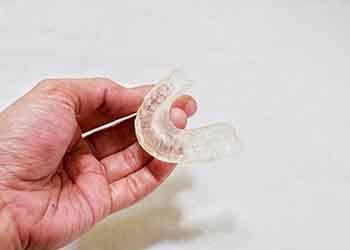TMJ Treatment in Gorham
We Believe in Relieving Your Pain

Your temporomandibular joint (TMJ) is a vital part of what allows you to express yourself and enjoy life’s simple pleasures like eating and conversing. When there's trouble with your TMJ, it can feel like you're carrying the weight of the world in your jaw, with chronic pain and discomfort making even the smallest tasks daunting. You deserve to live without the burden of TMJ pain.Our skilled dentists are ready to provide a personalized TMJ treatment plan just for you, designed to fully alleviate your pain.
Why Choose Morgan Dental Care for TMJ Treatment?
- Customized, Comfortable Occlusal Splints
- Dental Practice Trusted by Community for 40+ Years
- Flexible Financing Options Available
What is TMJ Disorder?

A TMJ disorder is the result of the TMJ becoming overworked or injured. Sometimes it may occur after you take a sudden blow to the jaw. It could also be a consequence of the discs of your jaw joints moving out of their proper alignment. There are multiple possible causes for a TMJ disorder, with common risk factors including stress and teeth grinding. Regardless of the underlying problem, though, TMJ disorders can be very painful and significantly decrease your quality of life.
Symptoms of TMJ Disorder

You might have a TMJ disorder if:
- You keep hearing a clicking or popping sound when you move your jaw.
- There is pain in or around your jaw joints.
- Your jaw sometimes becomes locked, preventing you from opening or closing it.
- You are suffering from migraines or headaches.
- You have noticed pain in your neck or back.
As soon as you notice any possible symptoms of TMJ disorder, you should get in touch with our office. The sooner we see you, the sooner we can diagnose the problem.
Types of TMJ Treatment

Our team will likely have to take X-rays of your mouth and jaw before we can confirm that you have a TMJ disorder. Once we do, we can let you know what options for treatment are best suited for your specific situation. If you read on, you can learn more about the solutions that our team can provide for relieving jaw pain.
Occlusal Splint

An occlusal splint is a type of oral appliance that can adjust the position of your lower jaw. This takes some of the pressure off of your TMJ so that it can rest. On top of that, an occlusal splint can be a good solution for any teeth grinding that might occur while you’re asleep; by wearing it, you can prevent the upper and lower arches of teeth from making direct contact with each other.
Equilibration/Occlusal Adjustment

Your TMJ disorder could be the result of teeth that don’t come together properly. As such, we can sometimes help you find relief by making changes to the teeth in question. A small amount of enamel will be removed in order to create a more balanced bite that doesn’t put as much pressure on your TMJ.
TMJ Treatment FAQs
Can TMJ Be Cured Permanently?
TMJ disorders often stem from things like stress, teeth grinding, or bite misalignment making it challenging to eliminate completely. However, at Morgan Dental Care, we offer treatment options that can provide significant and lasting relief. With a personalized treatment plan that may include occlusal splints, lifestyle changes, or bite adjustments through occlusal equilibration, many patients experience reduced pain and improved function. Consistent follow-ups and preventive care can also help manage symptoms and prevent them from returning!
Can TMJ Be Fixed with Invisalign?
In some cases, Invisalign can help treat TMJ disorders, especially if the underlying cause is related to teeth misalignment. By gradually shifting your teeth into better positions, Invisalign can improve bite alignment, reducing the pressure on your TMJ and alleviating discomfort. Our team will give you a thorough examination to decide if Invisalign is a good option for your TMJ treatment. While Invisalign may not be a complete solution for every TMJ issue, it can play a part in reducing symptoms for patients whose jaw pain is linked to bite problems.
How Long Does It Take for a TMJ Splint to Work?
The effectiveness of a TMJ splint can vary, but many patients start noticing some relief within a few days to a few weeks of consistent use. However, for more significant improvements, it usually takes around three to six months of wearing the splint as directed. The device helps relax your jaw muscles, reduce clenching or grinding, and improve overall jaw alignment. Consistency is key, but everyone is different, so some patients may see results faster than others.
How Long Does Occlusal Equilibration Take for TMJ?
Occlusal equilibration is a procedure used to adjust your bite for TMJ treatment and typically takes one to three appointments. Each session may last around 30 to 60 minutes, depending on the complexity of your bite issues. Our team will carefully reshape the biting surfaces of your teeth to create a more balanced and even bite, reducing pressure on the TMJ. While immediate relief is possible, the full benefits may take several weeks as your jaw muscles adapt. Regular follow-ups help ensure the best results and long-term comfort.
